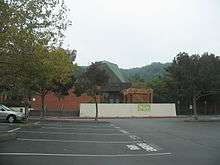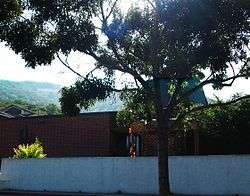Rodef Sholom (San Rafael, California)
| Congregation Rodef Sholom | |
|---|---|
|
Congregation Rodef Sholom during Sukkot 5771 (2010) | |
| Basic information | |
| Location |
170 N. San Pedro, San Rafael, California, |
| Geographic coordinates | 38°01′24″N 122°32′49″W / 38.0232°N 122.5470°WCoordinates: 38°01′24″N 122°32′49″W / 38.0232°N 122.5470°W |
| Affiliation | Reform Judaism |
| Status | Active |
| Leadership | Senior Rabbi Stacy Friedman, Associate Rabbi Michael Lezak, Rabbi-Cantor Elana Rosen-Brown, Cantor David Margules |
| Website | rodefsholom.org |
| Architect(s) | Marquis & Stoller |
| Groundbreaking | 1961 |
Congregation Rodef Sholom, founded in 1956, is a Reform Jewish Congregation located on the Lonee C. Hoytt Jewish Campus in San Rafael, California.[1] Prior to its establishment, Shabbat services were held at the Marin Jewish Community Center, established in 1946 at Mission and Forbes Street.[2] The congregation met at the center until 1962 when it moved to its current location.[3] The congregation shares a campus with the Osher Marin JCC and the Brandeis Hillel Day School. Rodef Sholom has been affiliated with the Union for Reform Judaism since 1957. The congregation receives its name, meaning "pursuers of peace," from a Talmudic quote by Rabbi Hillel: "Be among the disciples of Aaron, loving peace and pursuing peace, loving people and bringing them closer to the Torah."[4]
History
During the 1940s the Marin Jewish community would gather at houses in the community for Shabbat services. B'nai B'rith, Hadassah, and Council of Jewish Women also established chapters within the county, and in 1948, the Marin Jewish Community Center was opened at 1618 Mission Avenue.[5] The JCC held kabbalat shabbat and shabbat services each week in its sanctuary, and out of these services grew Rodef Sholom in 1956 and Kol Shofar in 1962.[3]
Congregation Rodef Sholom was founded in 1956 by Harry Albert, Abe Blumenfeld, Sidney Braverman, Samuel B. Herst, David J. Rosenberg, Sidney Rudey, Aaron Schwartz, and Julius Selinger.[6] The congregation grew from 64 families upon establishment to 143 by the high holy days. Rabbi Julius A. Liebert and Cantor Louis Roller, the congregation's first clergy, led services in the JCC sanctuary. The temple sisterhood, then called the Ladies Auxiliary, formed that same year. During its first year, membership was divided between a Reform or Conservative affiliation. However, in 1957, under the direction of Rabbi Morton Hoffman, Rodef Sholom formally became a Reform congregation by joining the Union of American Hebrew Congregations. By 1959, the Jewish population of Marin County was 2,700[7] with 225 families belonging to Rodef Sholom, and over 300 children attending its religious school.
On June 4, 1961, after 4 years of fundraising, the community held a groundbreaking ceremony for its new synagogue, which would be completed and dedicated on May 4, 1962. Jane Slater Marquis and Claude Stoller designed the architecture of the building.[8] The new building featured a stain glass window in the hexagonal high ceiling that was donated by the Koch family, stain glass windows at the front entrance donated by Mrs. Harry Albert, and an organ from the Men's Club.[5] Rabbi Morton Hoffman left the congregation in 1970, and Rabbi David Davis became the new senior rabbi, serving for 7 years.
In 1977 Rabbi Michael Barenbaum was hired to lead the congregation. That same year the congregation began holding high holy day services at the Marin County Civic Center, which allowed for the entire congregation to worship together. Several associate rabbis served under Rabbi Barenbaum including Rabbi Robert Daum (1986–1993), Rabbi Miriam Baitch (1982–1986), and Rabbi Lee Bycel (1979–1982). Barenbaum became Rodef Sholom's longest serving rabbi when he retired in 2003 after 27 years of service.[9] Barenbaum was honored by Senator Barbara Boxer on a February 2003 session.[10] During his tenure, the congregation's numbers grew from 300 members to 1,100 families.[11] In 2003, after 10 years of service as Rodef Sholom's associate rabbi, Rabbi Stacy Friedman became senior rabbi, and was joined by Associate Rabbi Michael Lezak and Assistant Rabbi Noa Kushner.
In 2009, Rodef Sholom received a Next Dor grant[12] from Synagogue 3000 to develop its NITA program, led by Rabbi Noa Kushner.[13] The program's name, NITA, comes from the Hebrew word meaning "we will grow," and aims to bring unaffiliated Generation X and Y Jews into a comfortable non-synagogue environment where they can "do Jewish stuff."[14] The group meets for havdalah, hikes, storahtelling, and once-monthly kabbalat shabbat services.[15]
Religious school
In 1944, the first Jewish organization in Marin was formed, the Marin Jewish Sunday School Association, which arose out of the need for standardized Jewish education within the community.[6] Throughout the next few decades classes met at Marin Country Day School, Tamalpais High School, the International Order of Odd Fellows lodge, Scout Hall, and the San Anselmo Library. On November 12, 1965, Rodef Sholom's Religious School building was dedicated. In 1967, vandals burned down Blumenfeld Hall, and some classes were held at Blessed Sacrament Church during the rebuilding.[6]
Brandeis Hillel Day School established its Marin campus in the facility in 1978. The school is accredited by the California Association of Independent Schoolsand the Western Association of Schools and Colleges, and affiliated with the Bureau of Jewish Education, RAVSAK, Northern California Jewish Community Day School Network, National Association of Independent Schools, and JESNA.[16]
Clergy

Current
- Senior Rabbi Stacy Friedman - (Associate Rabbi: 1993 - 2003; Senior Rabbi since 2003) Ordained at the Hebrew Union College-Jewish Institute of Religion in 1993.[17]
- Associate Rabbi Michael Lezak - (Associate Rabbi since 2003) Ordained in New York by Hebrew Union College-Jewish Institute of Religion in 1999.[17]
- Cantor David Margules - (Cantor since 1991) Master of Arts degree in sacred music from the Hebrew Union College Jewish Institute of Religion in 1987.[17]
- Rabbi-Cantor Elana Rosen-Brown (Assistant Rabbi since 2014) Ordained in New York by Hebrew Union College-Jewish Institute of Religion in 2012 as cantor and 2014 as rabbi.
Past clergy
- Rabbi Emeritus Michael Barenbaum (1977–2003) Ordained at the Hebrew Union College Jewish Institute of Religion in Cincinnati.[17]
- Rabbi Noa Kushner - (Assistant Rabbi, 2005-2011) Ordained in New York by the Hebrew Union College-Jewish Institute of Religion in 1998.[17][18]
- Rabbi David Davis (1968–1976)[5][19]
- Rabbi Morton Hoffman (1957–1968)[5]
- Rabbi Julius A. Liebert (1956–1957)[5]
- Rabbi Robert Daum (1986–1993)[5]
- Rabbi Miriam Baitch (1982–1986)[5][20]
- Rabbi Lee Bycel (1979–1982) [5][21]
- Cantor Brian Reich[5]
- Cantor Steven Puzarne[5]
- Cantor Rita Glassman (1986–1991)[22]
References
- ↑ http://www.rodefsholom.org/about-rodef-sholom/history-and-mission
- ↑ http://www.marinjcc.org/about_us.html
- 1 2 Zarchin, Michael Moses Glimpses of Jewish life in San Francisco, 1964, page 233
- ↑ Mishnah Avot 1:12
- 1 2 3 4 5 6 7 8 9 10 Battat, Lee, ed., Celebration 40: The First Forty Years of Congregation Rodef Sholom 1956-1996, October 1996
- 1 2 3 Battat, Lee, Congregation Rodef Sholom: Twenty Fifth Anniversary 1956-1981: A Congregational History, Congregation Rodef Sholom, December 1981
- ↑ Massarik, Fred, Ph.D., Jewish Population of San Francisco, Marin County and the Peninsula 1959, Jewish Welfare Federation of San Francisco, Marin County and the Peninsula, 1959
- ↑ "Rodef Sholom Synagogue San Rafael, California ca. 1967", Black Mountain College
- ↑ Berns, Suzan "‘Rabbi Michael’ leaves bimah amidst virtual love fest", J Weekly, February 3, 2003
- ↑ "Rabbi Michael Barenbaum", Congressional Record Proceedings of the 108th Congress, Volume 149, Part 4, Government Printing Office, Page 4354
- ↑ Cohn, Abby, "Rabbi bids farewell to Rodef Sholom, but not to tikkun olam", J Weekly, February 3, 2003
- ↑ Kushner, Noa, "Nita Who?", The Voice, Congregation Rodef Sholom, May 3, 2010
- ↑ Welte, Jim, "DIY religion: In spiritually fickle Marin, change is in the air," Marin Independent Journal December 26, 2009.
- ↑ Adler, Sara, "Judaism for Gen X: Get your Jewish on", The San Francisco Chronicle, September 06, 2010
- ↑ Palevsky, Stacey, "In Marin, unaffiliated families find Judaism in novel ways", J-Weekly, May 20, 2010
- ↑ http://www.bhds.org/about_bhds/about_accreditation.asp
- 1 2 3 4 5 http://www.rodefsholom.org/leadership-at-rodef-sholom/clergy
- ↑ Silvers, Emma, "New Group of Upstarters Spans a Wide Landscape" J Weekly, May 19, 2011
- ↑ http://www.templenashville.org/index.php?file=/_content/1_about_temple/bios.htm
- ↑ Vardey, Lucinda The Flowering of the Soul: A Book of Prayers by Women, page 402
- ↑ "Activist Rabbi returns to the bay area with AJWS", J Weekly
- ↑ Katz, Leslie, "Boundary-crossing cantor brings soul to Conservative shul", J Weekly, February 12, 1999
External links
- Congregation Rodef Sholom Official site.
- NITA
- Union for Reform Judaism: Rodef Sholom Directory listing.
